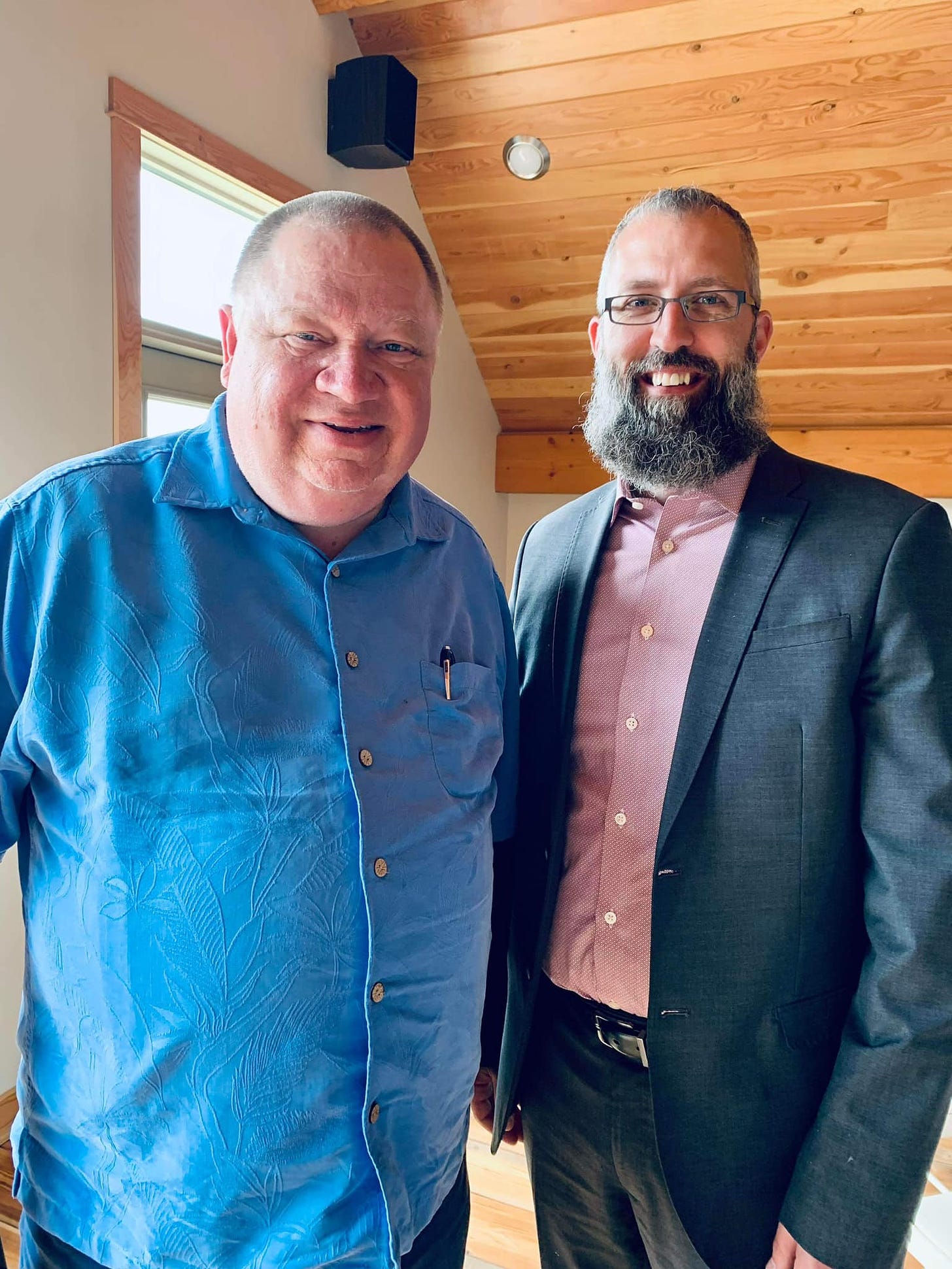We Can’t Be First-Century Evangelists
We cannot take for granted about our culture what the earliest first-century evangelists did about theirs.
Dear friends and supporters,
Sharon and I are at the Runner Academy in spectacular Golden, British Columbia, set in the Canadian Rockies (see photos below), so this e-letter will be brief.
As our culture has become radically secularized and neo-paganized, many Christians suggest the Faith has returned to a cultural situation similar to that of the earliest first-century Christianity, particularly in its relation to our prospects for evangelism. Like our present culture, that Palestinian culture was radically anti-Christian. Christians were in a distinct minority, and their evangelistic practices had to account for their particular hostile environment. This interpretation gives these Christians a larger-than-glimmer of hope, in that they’re confident we can reproduce today the evangelistic strategies of the earliest Christians.
In fact, today’s secularized situation might in some sense be preferable, because we have in the Bible a paradigm for Christians evangelizing within a non-Christian society (the apostolic and early patristic church), but no paradigm for evangelizing within a Christian society such as the Middle Ages or Reformation era. The earlier Christian evangelists are our pattern.
But this interpretation won’t survive even the most casual scrutiny. Consider, for example, the intellectual barriers to evangelism in the earliest part of the New Testament era (the greatest intellectual barrier, of course, is the rebellious heart, but that is true in every era). What presuppositions kept the majority of the earliest hearers of the gospel from believing it?
First-Century Evangelists
Almost all of them were Jews. They believed in one God; they were monotheists. They believed in sin, a violation of Torah. They believed in the created order and in God the Creator. They all believed in a future judgment. Many of them believed in the resurrection; some did not. In other words, almost all of them shared with the earliest Christians the basic structure of a godly worldview.
They were lacking one thing, and of course that one thing presented an insuperable barrier: they did not believe that a Jewish rabbi from Nazareth reputed for going about doing good and who had been crucified on a Roman cross had actually risen from the dead and thereby proved himself to be what he’d claimed all along: the Jewish Messiah, the Son of God, God in the flesh in fact, the only hope of salvation.
Their problem was not basically a worldview problem, but a Jesus problem. (Brian Mattson reminded me that the gentile audience Paul later evangelized harbored a worldview remarkably similar to the West’s today.)
Twenty-First Century Worldviews
Now let us consider Western culture today. It doesn’t so much have a Jesus problem as it has a worldview problem. Not that secularists believe in the biblical Jesus, but they are not furiously denying that he is Messiah, either. In fact, they care little for Jesus at all one way or another. If some of his moral teachings coincide with their life’s objectives, he might even be helpful to them: “Jesus is my life coach.”
No, Jesus as such is not the problem.
The problem is that they do not believe God created the universe. They do not believe man is a sinner. They do not believe man is standing under God‘s righteous judgment. They do not believe in the norms by which the cosmos are structured: the Creator-creature distinction, man created in the image of God, man as distinctly male and female, and the cultural mandate. Because of this utterly contra-creational worldview, they couldn’t believe in the Jesus of the Bible even if they wanted to.
David Wells once pointed out that the gospel has meaning only within God’s morally shaped universe. The gospel is meaningless in a universe in which sin is an outmoded myth, God is a female, truth is relative, men and women are interchangeable, and sex is a social construction.
This is why worldview is requisite to the gospel.
We must always in every situation and era evangelize by preaching Jesus, but we must today preach Jesus within the worldview that he as Mediator of creation fashioned. We must preach the Jesus-created world in its truth of the dignity of the human person, its sexual norms, its distinction between male and female, its calling to steward the earth for his glory, and all this entails.
We cannot take for granted about our culture what the earliest first-century evangelists did about theirs.
This doesn’t mean that unbelievers must formally accept all of these truths; it does mean that they cannot become a believer while denying them. They must repent of their rebellious, contra-creational worldview.
In short, you can’t become a Christian if you believe that God equals the world, that homosexuality is an acceptable lifestyle, or that there are no sins but racism, toxic masculinity, and homonormativity.
Francis Schaeffer called this “pre-evangelism.” I would suggest that it’s simply one aspect evangelism, which is the Christian worldview. In short, evangelism is one aspect of Christian worldview preaching.
The great evangelistic imperative in our postmodern world includes the preaching of the crucified and risen Lord within the world as he created it.
Christian evangelism must challenge the most basic assumptions of postmodern man.
Scenes from Runner Academy 2022
“Ideas, like people, have ancestors.” PAS
“The question isn’t whether you’ll be culturally engaged. We’re all culturally engaged whether we know it or not.”
Dr. Joseph Boot
With fellow speaker Pastor Tim Stephens of Fairview Baptist, Calgary. Pastor Stephens was twice arrested and jailed for keeping his church open in defiance of COVID-19 lockdown edicts.
I asked him, “May I get a photo with a man of God who went to jail for Jesus Christ?”
Dr. Brian Mattson contrasting pagan transcendence and immanence with Christian transcendence and immanence, employing Dr. John Frame’s illuminating diagram.
Will you consider a tax-deductible donation to CCL via PayPal or Venmo? Or mail a check to CCL, Box 100, Coulterville, CA 95311. God uses you to keep us going — and expanding.
Founder & President, Center for Cultural Leadership
The Alt-World
Satan offers man an alternative reality to God’s good created world, but God in Christ is de-privileging, deconstructing, and demolishing that world.
Listen here.
More great stuff:
The Center for Cultural Leadership site is here.
My Amazon author page (print and digital) is here.
You can find my sermons and lectures at my YouTube channel.
Sign up to get my blog updates here.
Here’s my Twitter feed.
If you want to get the free exclusive hard copy publication Christian Culture, please send me a Facebook private message.
The CCL phone number is 831-420-7230.
The mailing address is:
Center for Cultural Leadership
P. O. Box 100
Coulterville, CA 95311










Well said. I hadn't considered this problem to modern evangelism. Perhaps we need Paul's "Mars Hill" approach?
“Christian evangelism must challenge the most basic assumptions of postmodern man.” Powerful truth.